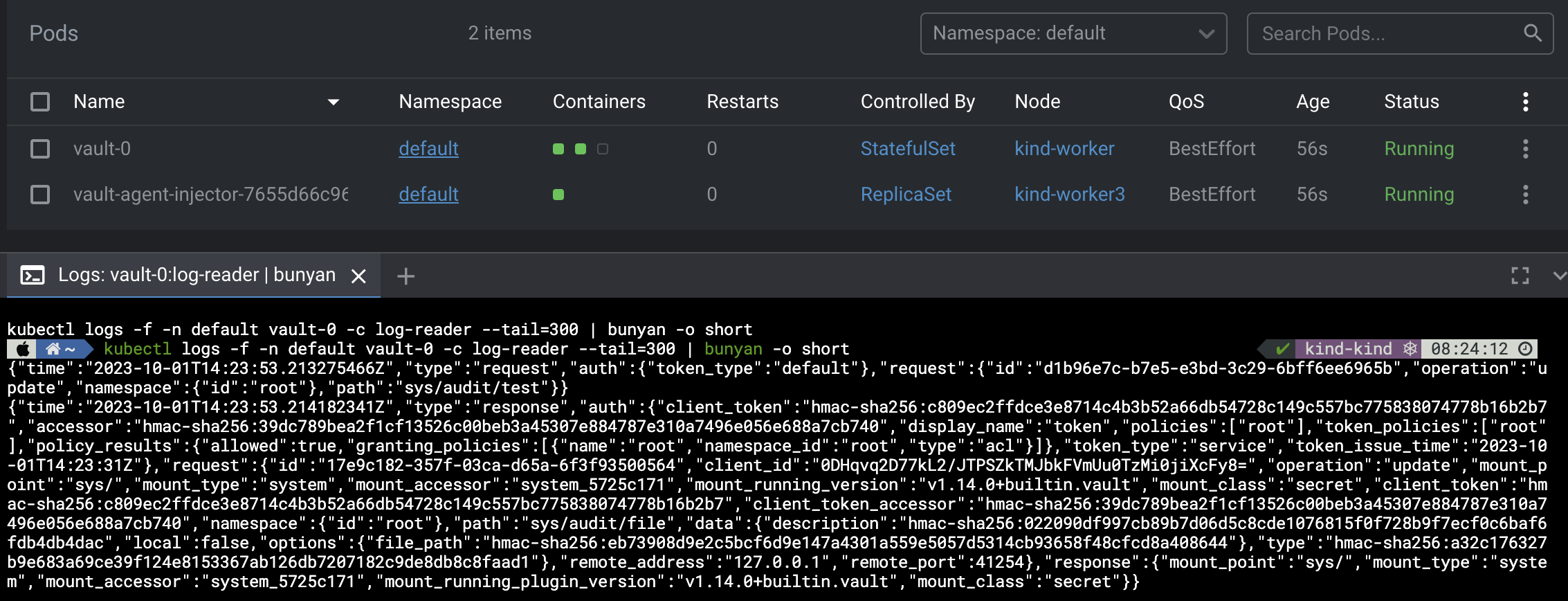Use a Sidecar Container to Read Logs from Another Container

Today I Learned
Kubernetes, and more specifically Docker, push you to use a pattern of logging to standard out (stdout/stderr). If you have applications that instead log to a file, it can be tricky to get these logs where you want them to go.
A sidecar will run a new container inside your pod, and both your existing container (e.g. log-writer) and the new container (e.g. log-reader) will mount a shared volume. Once you have the shared volume, a writer can write data here and the reader can output wherever it needs to go (e.g. remote SIEM, syslog, etc.).
Example Config
It’ll run the initContainers before the others start, making sure the audit file exists. This will prevent the healthchecks on the other containers from failing.
Using tail to read the audit log
kubectl apply -f sidecar-example.yml
# Read the log-writer logs from the log-reader container
kubectl logs log-writer-and-reader -c log-reader
sidecar-example.yml
apiVersion: v1
kind: Pod
metadata:
name: log-writer-and-reader
spec:
initContainers:
- name: init-log-file
image: busybox:1.31
command: ["touch", "/var/log/audit.log"]
volumeMounts:
- name: logs
mountPath: /var/log
containers:
- name: log-reader
image: ubuntu:latest
command: ["tail", "-f", "/var/log/audit.log"]
volumeMounts:
- name: logs
mountPath: /var/log
- name: log-writer
image: busybox:1.31
command:
["sh", "-c", "while true; do echo $(date +'%Y-%m-%dT%H:%M:%S') >> /var/log/audit.log; sleep 2; done"]
volumeMounts:
- name: logs
mountPath: /var/log
volumes:
- name: logs
emptyDir: {}
Using fluentd to read the log
kubectl apply -f sidecar-example-with-fluentd.yml
# Read the log-writer logs from the log-reader container
kubectl logs log-writer-and-reader -c log-reader
sidecar-example-with-fluentd.yml
apiVersion: v1
kind: ConfigMap
metadata:
name: fluentd-config
data:
fluentd.conf: |
<source>
@type tail
tag audit.logs
path /var/log/audit.log
pos_file /var/log/audit.log.pos
format none
</source>
<match **>
@type stdout
</match>
---
apiVersion: v1
kind: Pod
metadata:
name: log-writer-and-fluentd
spec:
initContainers:
- name: init-log-file
image: busybox:1.31
command: ["touch", "/var/log/audit.log"]
volumeMounts:
- name: logs
mountPath: /var/log
containers:
- name: log-writer
image: busybox:1.31
command:
[
"sh",
"-c",
"while true; do echo $(date +'%Y-%m-%dT%H:%M:%S') >> /var/log/audit.log; sleep 2; done",
]
volumeMounts:
- name: logs
mountPath: /var/log
- name: fluentd
image: fluent/fluentd:v1.16-1
env:
- name: FLUENTD_CONF
value: "fluentd.conf"
volumeMounts:
- name: logs
mountPath: /var/log
- name: fluentd-config
mountPath: /fluentd/etc/fluentd.conf
subPath: fluentd.conf
ports:
- containerPort: 24224
volumes:
- name: logs
emptyDir: {}
- name: fluentd-config
configMap:
name: fluentd-config
Hashicorp Vault Audit Logs

Let’s look at Hashicorp Vault. Vault supports setting up an audit log for all actions that take place, but the current options for remote logging are limited. It’s also against best practice to add an additional service (e.g. logging agent) to a container. This leads us to using a sidecar to ship audit logs from Vault.

Using tail to read the audit log
These values override the default values of the Helm chart.
# See full values.yml below
helm install vault hashicorp/vault --version 0.25.0 --values values.yml
# Connect to pod in order to enable audit logging
kubectl exec -it vault-0 -c vault -- /bin/sh
vault audit enable file file_path=/vault_audit/audit.log
# you should be able to see all the logs from your log-reader container
kubectl logs vault-0 -c log-reader
values.yml
global:
enabled: true
server:
affinity: ""
updateStrategyType: RollingUpdate
# Use dev mode so vault is already initialized and unsealed for testing
dev:
enabled: true
volumes:
- name: logs
emptyDir: {}
volumeMounts:
- name: logs
mountPath: /vault_audit
extraInitContainers:
# Create the audit.log file so health checks on other containers don't fail
- name: init-log-file
image: busybox:1.31
command: ["touch", "/vault_audit/audit.log"]
volumeMounts:
- name: logs
mountPath: /vault_audit
extraContainers:
# Replace with a container like fluentd that will read and ship logs to external systems
- name: log-reader
image: ubuntu:latest
command: ["tail", "-f", "/vault_audit/audit.log"]
volumeMounts:
- name: logs
mountPath: /vault_audit
Using fluentd to read the log
First set up a ConfigMap storing your fluentd config.
kubectl apply -f fluentd-configmap.yaml
helm install vault hashicorp/vault --version 0.25.0 --values values.yml
kubectl exec -it vault-0 -c vault -- /bin/sh
vault audit enable file file_path=/vault_audit/audit.log
kubectl logs vault-0 -c fluentd
fluentd-configmap.yaml
apiVersion: v1
kind: ConfigMap
metadata:
name: fluentd-config
data:
fluentd.conf: |
<source>
@type tail
tag audit.logs
path /vault_audit/audit.log
pos_file /vault_audit/audit.log.pos
format none
</source>
<match **>
@type stdout
</match>
values.yml
global:
enabled: true
server:
affinity: ""
updateStrategyType: RollingUpdate
dev:
enabled: true
volumes:
- name: logs
emptyDir: {}
- name: fluentd-config
configMap:
name: fluentd-config
volumeMounts:
- name: logs
mountPath: /vault_audit
extraInitContainers:
- name: init-log-file
image: busybox:1.31
command: ["touch", "/vault_audit/audit.log"]
volumeMounts:
- name: logs
mountPath: /vault_audit
extraContainers:
- name: fluentd
image: fluent/fluentd:v1.16-1
env:
- name: FLUENTD_CONF
value: "fluentd.conf"
volumeMounts:
- name: logs
mountPath: /vault_audit
- name: fluentd-config
mountPath: /fluentd/etc/fluentd.conf
subPath: fluentd.conf
ports:
- containerPort: 24224
For the reader
With this, you can set up a sidecar container running Fluentd to read the audit logs created by your other containers. Now, you can update the Fluentd configuration to send these logs to a remote collection point using your favorite output plugin.
